“Bob Marley: One Love” Co-writer/Director Reinaldo Marcus Green on Capturing a Legend’s Spirit
Bob Marley’s family has been trying to create and release a narrative that celebrates the beloved Jamaican performer’s life and music for decades. Only recently did the producers, including Rita, Bob’s wife, and her children Ziggy and Cedella Marley, feel like all the pieces had come together to create a story worthy of Bob’s legacy. The perfect blend of talent to bring Bob’s story to the big screen included casting Kingsley Ben-Adir and Lashana Lynch as Bob and Rita Marley and hiring Reinaldo Marcus Green, director of the Oscar-winning film King Richard, to be at the helm.
There were other factors important to not just the producers but to the cast and director. The locations of the film that represent seminal moments in Bob’s life had to take place in Jamaica, and Jamaicans had to be represented in the cast and crew. As a result, the finished film Bob Marley: One Love features over 250 Jamaican artists, experts, tradespeople, and performers.
One Love focuses on the period between 1976 and 1978, a time in which Bob recorded the album Exodus and performed two historic concerts, Smile Jamaica and the One Love Peace Concert, amidst political turmoil and great danger to him personally.
Since One Love tells the story of one of the biggest heroes in Jamaican history, co-writer and director Reinaldo Marcus Green felt the weight of the endeavor. He has succeeded with the finished movie, as it is being embraced by Bob Marley fans around the world. The Credits spoke to Green about being entrusted with this very important musical hero’s legacy through Bob Marley: One Love.
Kingsley Ben-Adir was great in the role, right down to capturing Bob’s Nine Mile patois. It’s not a dialect, it’s a language. Can you talk about his work with Fae Ellington to perfect that, as well as her role in the accurate portrayal of Jamaican culture in the film?
Fae was instrumental. She was a friend of Bob’s and a friend of the family. She also grew up when she saw the evolution of patois, the words they used back then, and what was historically accurate. We were incredibly lucky to have a historian like her involved. She was instrumental to us in so many ways, especially with language. One Love is a foreign language film, and it is important when people hear it they try to understand what we’re saying. Given how Bob spoke, we knew that was a challenge in this film. For Kingsley, the process of transcribing the language was probably one of the most difficult challenges of the role because he’s not a native patois speaker. So if we had a rewrite, that would have to get transcribed into patois, but then it would have to get another layer, which would be “Bob speak.” Then, it would have to be written out phonetically for Kingsley to study so that he could not just say the words but understand what he was saying. With that process, you can only imagine how challenging it was.
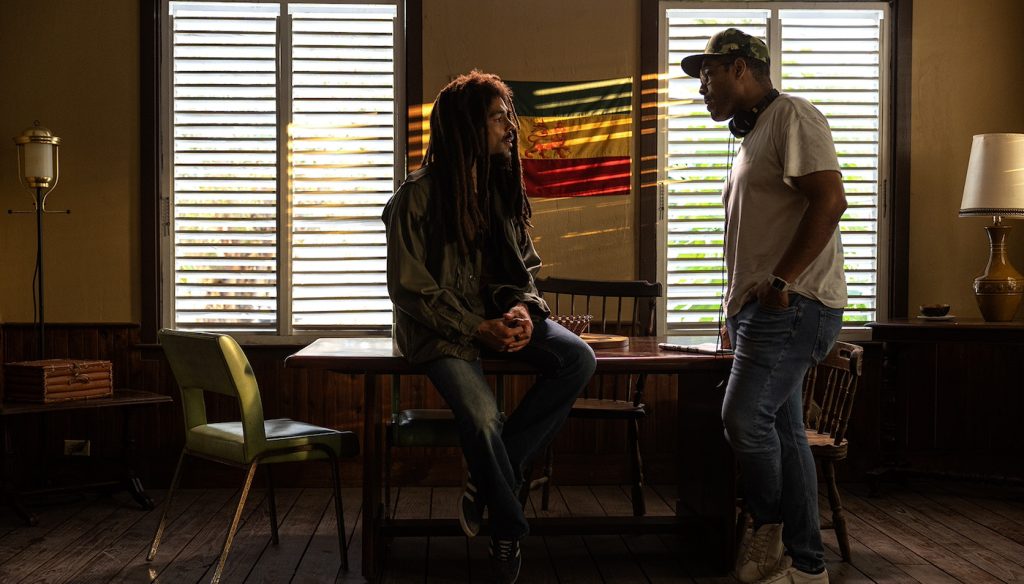
You shot for 26 days in Jamaica. What locations did you feel were essential, and what can fans look for that are authentic to Bob’s life?
Well, Trench Town is a character in the film, really. It’s where Bob grew up. It’s where he played football, and where his friends were, and so we wanted to capture the streets of Trench Town. You see him running, we went to Second Street, where Bob was from. For anybody who has never been to Jamaica, we went to the area that Bob was from, which was key. Fifty Six Hope Road is now a museum. A lot of that original architecture changed, so we actually built a house that was closer to the real Hope Road than the one that currently exists. We wanted to capture the energy of that space, and that was pretty fantastic.
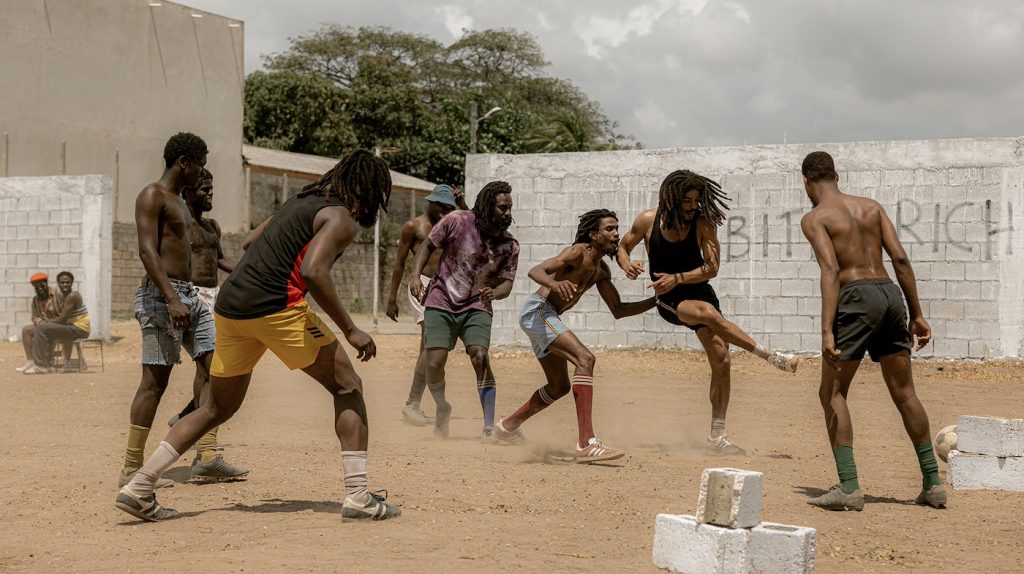
And the concerts were filmed in the place they were originally held?
Yes. Smile Jamaica, and the One Love Peace Concert we shot at National Heroes Park. It felt like we were on sacred ground. We were in the same exact location that Bob was when he performed. To go back, to recreate the stage, that was really special. Everything was a bit lo-fi there, which was kind of great. No fancy lighting. We tried to capture a little bit of that, in a cinematic way, just how lo-fi it was back then. So everything you see in Jamaica is real, and what we built there, we built for accuracy.
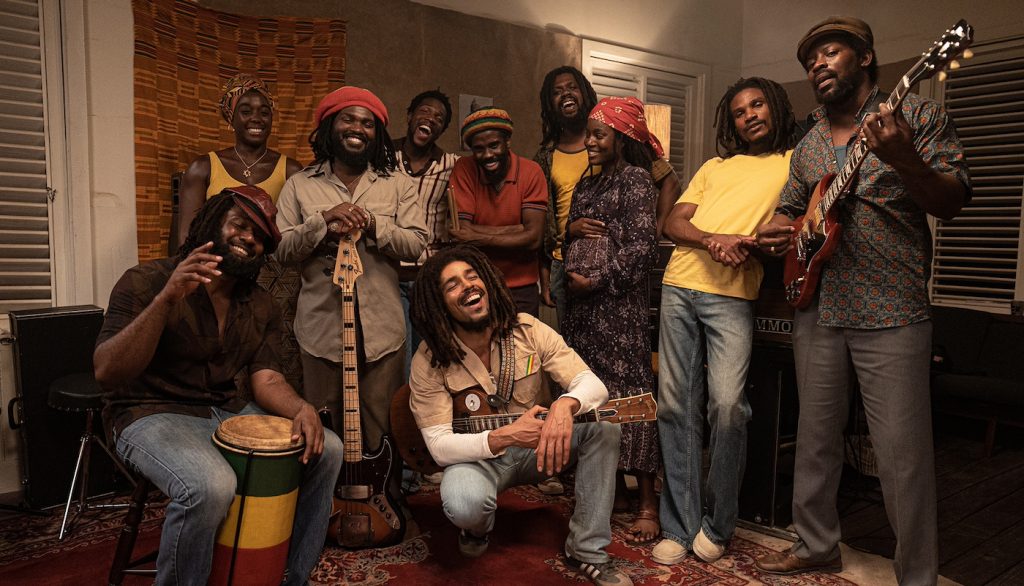
The concerts had to be quite an undertaking, especially working for the right feeling, but you had real musicians and Kingsley, who had rehearsed Bob’s dancing almost to perfection.
We were very fortunate to have Neville Garrick who was Bob’s artistic director. He designed the Exodus album cover and did all the lighting for their shows. We had him there to tell us what the lighting was, and remind us of the lights and the colors he chose, and how he always backlit Bob and gave him a spotlight. Those details helped to make that real.
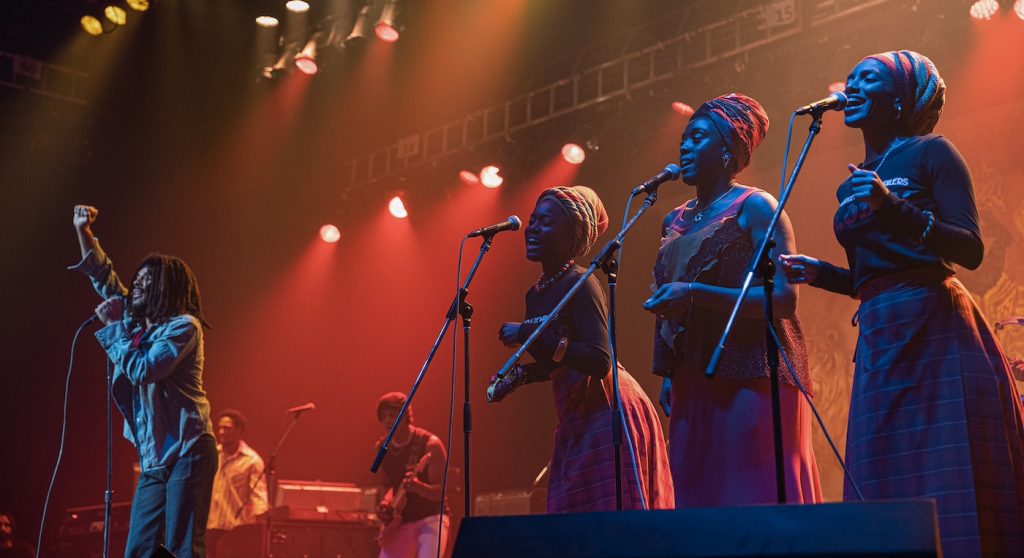
Rita’s story is Bob’s story. How did it shift in the process of the production, and what elements of her part of the story did you feel were essential? How did Lashana, who is of Jamaican descent, uniquely bring that to life?
I read Rita’s book when I was in prep, and it changed everything for me because it was a unique perspective. It was raw, hard, and heavy. It wasn’t reflected in the early drafts, so I knew there was an important perspective there. To me, one of the single most important things that I learned was that Rita taught Bob about Rastafarianism. That was a monumental gift. It changed his life forever. It’s what he sang about and what gave him his spiritual guidance. Rita was responsible for that. She was not just the mother to his children and other children; she was also a band member, so it just gave her this unique perspective, and for our production, a unique perspective into Bob’s life. That became the spine of our film. And then Lashana, being of Jamaican descent, had that pridefulness and ferocity as an actress and was protective of the culture and of the dimensionality we were trying to create with our story. She demanded excellence and wanted to honor his legacy, as we all did.
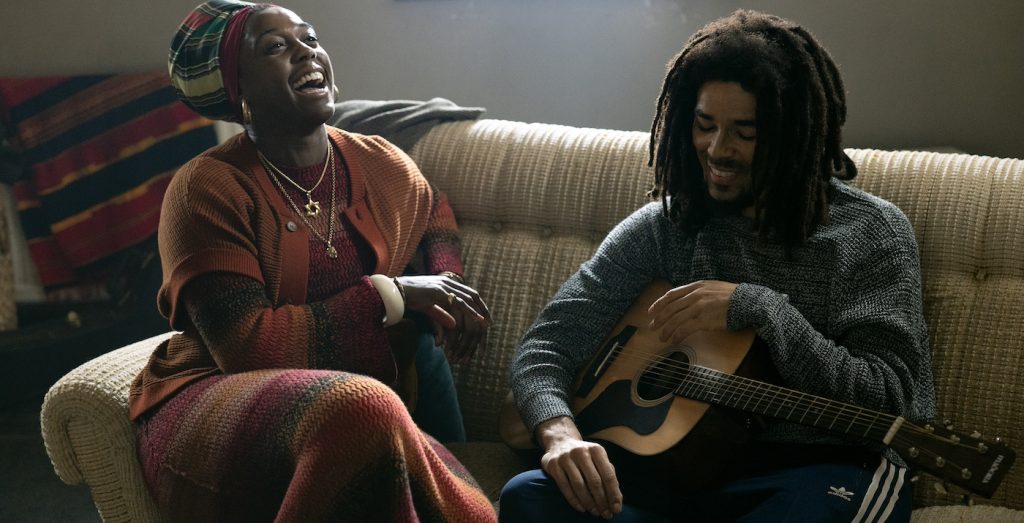
There is a spiritual aspect to the story. You can’t extricate Bob Marley from the Rastafarian religion.
Spirituality was in everything that Bob did, and it was important that we reflected that Bob was operating on a different plane, a deeper consciousness. To reflect that, we wanted to show visions in conjunction with the flashbacks. How can we visually capture that Bob saw and predicted things? For example, apparently, he had predicted the shooting before it happened. He had seen it in a vision, which was interesting to know about Bob. Our film takes on a slightly different shape because the story we were trying to tell was a little bit of “Redemption Song.” It’s Bob redeeming himself from the demons of his past. Oftentimes, it’s young kids who feel like they carry the burden of their parents, and I think Bob carried that burden of an absent father. He was running from that part of his life for a long time, and his spirituality saved him and lifted him up. I wanted the visions in the film to reflect that. There’s a transcendence that his music has. In Rastafarian culture, you don’t die. He may have left the physical world, but spiritually, he’s here, and his music and message are still here, and that’s a beautiful thing.
Bob Marley: One Love is in theaters nationwide.
Featured image: Kingsley Ben-Adir as “Bob Marley” in Bob Marley: One Love from Paramount Pictures.



